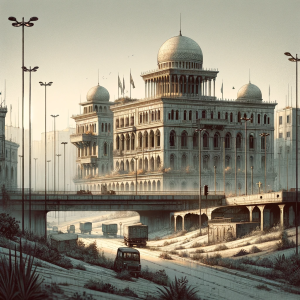“My husband wants to leave to make our living conditions better. Either he improves our situation or he dies.” – Hanan Erdidi, a woman with two children who can barely afford to feed her family.
“I’m a dad of two kids who are growing. I was hoping to raise them in better conditions, but unfortunately I can’t.” – Waid Kassraoui
Over a decade after the Arab Spring, these quotes encapsulate the dire situation in the very same country that birthed the movement – Tunisia. High cost of living and inflation, crippling unemployment, low wages, and shortages of basic resources – just to name a few – are causing many Tunisians to flee the country at the cost of potentially losing their lives at sea.
Tunisians are not alone in their hardships. In fact, nearly every country the Arab Spring spread to is currently experiencing economic downturns and political strife reminiscent of their struggle before the movement – some with the added disadvantage of massive crises such as in Libya and Morocco following a catastrophic flood and earthquake, respectively. Egyptians, as it stands, are forced to confront rolling blackouts, staggering unemployment rates, and housing insecurity that impacts the entire population.
Of course, a little over a decade’s time is not much for the region to expect sweeping changes and that should be acknowledged. However, it is also extremely telling that both under authoritarianism and democracy, little progress was made to bring to fruition a higher standard of living or solutions to the many other grievances the masses held. This is because regime type matters very little in the context of these types of issues. Regardless of what type of government rules a country, it is the nation-state system that cripples their chances of meeting the needs of the people. Under this system, countries are expected to behave independently, creating insular policies limited within their borders when the problems they are facing are anything but insular. While small improvements can be made, any effective or sustainable success throughout the region will always remain out of reach.
As it stands, the key challenges that all of these countries are burdened with are fundamentally the same. When one looks back on the causes for the movement itself, or even general discontentment throughout the Arab world, they will quickly see that much of it boils down to a few (albeit, massive) problems: lack of opportunity, low standard of living, an absence of diversification in industries, poor education, and rapid climate change causing instability (and sometimes catastrophes) that poses hindrances to daily life. None of these problems are particularly unique to any single country and are equally incapable of being solved by competing actions within each country. Whether it is the restriction of movement of labor and goods, the redundancy and inefficiency of duplicative systems, or the innate protection of domestic enterprises, the nature of the state system remains the primary obstacle in the way of fundamentally solving these challenges.
First, and starting from a basic and somewhat superficial level, the very existence of numerous different currencies, laws, parliaments and presidential palaces causes not only a massive waste within itself, but also results in constantly overlapping and often warring policies. Whether it involves the exchange of goods, labor, or services having numerous Arab or Muslim states with their own set of restrictions, borders, rules, and regulations is a huge impediment to trade, innovation, competition, and the exchange of ideas. Instead of free movement, supply chain economies, and free trade zones, these countries have duplicative, state protected, and highly inefficient state monopolies and industries.
This is not necessarily because the states or its leaders hate trade or are against prosperity, but is rather due to the inherent nature of the state-system which they are forced to comply with. Countries within the international system are only perceived to be as strong as the borders they maintain and as valuable as the benefits they derive from their citizenship status, causing them to inevitably fall into patterns of protectionism. This means that regardless of their desire to cooperate or create intra-regional systems that would better the lives of their people, they will continuously struggle (or even fail) to do so.
Ultimately, what these self-imposed limitations by way of perceived competition and a willingness to protect arbitrary border arrangements does is stifle opportunities for the majority of this region’s population. The consequences of that are apparent in the high unemployment rates of each country, low standard of living, and labor skill mismatches. The Arab world has a youth population that is considerably highly skilled for the Global South, but many college educated individuals are forced to work low-wage and lower-skilled jobs as a means for survival. Rather than using this demographic to their advantage, states continue to enact policies that hurt their people, simply because the system forces governments to prioritize state and border security above all.
As long as states in the Muslim world continue to engage in these above practices, their people will only suffer more. Solutions and long-term planning need to exist on a region-wide level, with policies that encourage economic integration transcending borders. Because much of the problem itself comes from the nature of the nation-state system – rather than any particular regime or government type – it is evident that the state system itself is not the best mechanism to achieve these types of solutions. Therefore, meaningful progress requires the relinquishing of outdated ideas of border security, nationalism, and competition and an understanding that this region has historically been deeply interconnected.
There are a multitude of avenues the region could take to enhance its integration and produce outcomes without the nation-state system that are not only beneficial to the population, but vitally necessary for the continued existence of its people. The fact that the Middle East and North Africa share a history of interconnectedness and integration is, of course, prevalent but there is the added factor of shared finite resources that the region must learn to better allocate – particularly water. All major river basins, tributaries, and groundwater aquifers in the region are considered shared amongst these countries and as climate change continues, there is a need for advanced regional cooperation in allocating this necessary resource. While the prevention of future “water wars” is paramount, it has also been proven that “water policy” is an incredible catalyzer for cooperation that surpasses borders.
Similarly, the deprioritization of borders can open the door to a whole slew of reforms and policies that will improve standard of living and enhance opportunities for the regional population. Firstly, states in the region spend a significant portion of their funds on military expenditures to protect their borders and prioritize state security; the absence of such a system would mean that these funds could instead be invested in public infrastructure, education, and sustainable energy development. This would have the added benefit of producing more jobs, diversifying industry, and creating long-lasting systems that will encourage regional economic development. Removing barriers to the movement of people and goods would improve trade and commerce, as well as free governments from the false notion that it is in their best interest to protect state-owned enterprises against intra-regional competition.
Letting go of the state-system and all of its roadblocks would create a pathway for diversification in a variety of key industries, one of the most important being information and communications technology. As it stands, the IT-BPO (Information Technology Business Process Outsourcing) industry is one of the fastest growing industries in the world. It has tremendous potential for job creation in this region especially, because so many of the unemployed youth population of the region has the skills to be successful in this field whether it be through engineering degrees or studies in design, development, and data science. Investing in IT-BPO at a region-wide level would mean that these former countries would no longer be competing with one another for economic growth, but could rather work together to be globally competitive against other regions in the world.
Ultimately, it is evident that under the current nation-state system – especially as it plays out in the Muslim world – there are no true paths to better people’s lives. This is exceptionally evident by the personal testimonies of many (regardless of which country they reside in). People do not see hope or progress in their states and they feel increasingly isolated, as they realize that their governments actively contribute to the worsening of their lives. While a complete and total overhaul of the state system seems daunting and difficult, even the first indicators of progress will be enough to ignite a wave of confidence in regional integration schemes. History and experience suggests that economic interconnectedness is directly linked to “early wins” that help build widespread awareness for the benefits of regional integration. This is, fundamentally, the paradigm shift the region needs in order to save itself.



